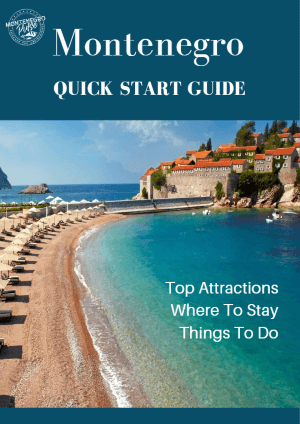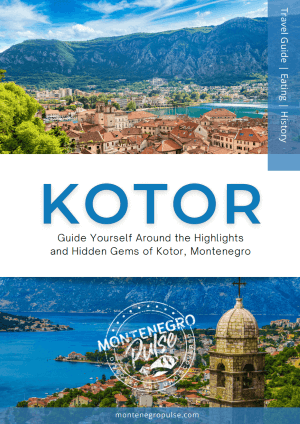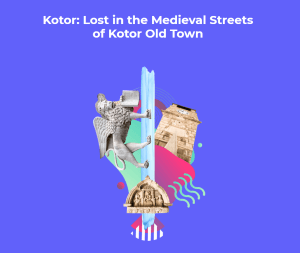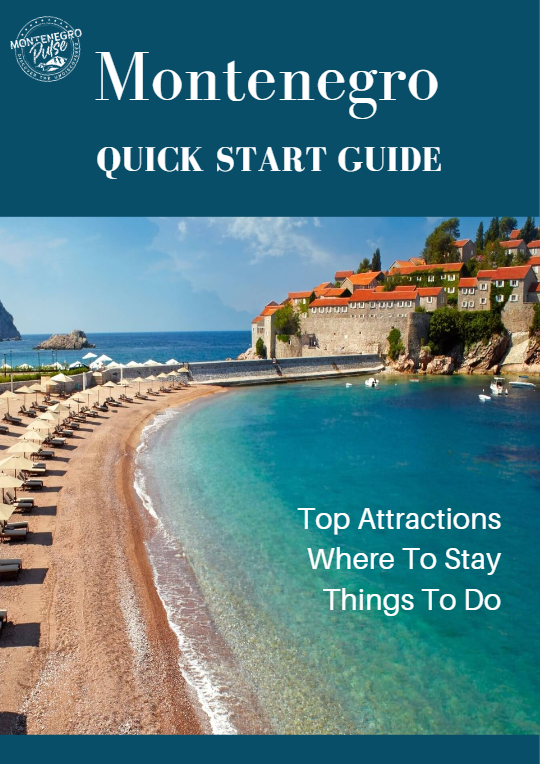Montenegro Pulse contains affiliate links and is a member of the Amazon Services LLC Associates Program. If you make a purchase using one of these links, I may receive compensation at no extra cost to you. See my disclaimer for more information.
Ultimate Guide to Buying Property in Montenegro + Free Advisor Help
If you're considering buying property in Montenegro, you're looking at a world of beautiful coastlines and peaceful living.
But, it's not always easy to figure out the local property rules or find the best investment.
I've lived in and owned property in Montenegro for 15 years. I have chosen to build my property portfolio here because it is such a good place to live and invest.
In this article you’ll learn about the risks and benefits of buying real estate in Montenegro, where to buy, the steps to buy real estate in Montenegro, current market values, extra costs involved, expected rental returns, and how you can get free professional advice.
Contents
Understanding Montenegro’s Property Market
The Purchase Proces: Step By Step
Buying Property in Montenegro Pitfalls
Why Montenegro?
There are many reasons why Montenegro is an attractive location for a second home, property investment, or even a new home base.
In fact, Montenegro is #1 on Forbes’ list of places to buy cheap real estate right now.
Here are some reasons Montenegro real estate is so popular:
Growing tourism: Montenegro's tourism industry has seen rapid growth, attracting visitors with its natural beauty and historical sites. This increase in tourism boosts the demand for rental properties, making real estate investment particularly lucrative.
Rental income potential: With the recovery of tourism, buying rental proper can be a steady source of income. Montenegro's popularity as a tourist destination means a high demand for short-term rentals. Long-term rents have risen 31% since 2021. You can expect to earn 4 - 8% in rental returns, one of the highest in the region.
Property value appreciation: Real estate in Montenegro is appreciating in value. As more people discover this hidden European gem, the demand for property is rising, meaning there is strong potential for investment growth.
“If Montenegro enters the EU, you could see strong appreciation. I believe you have the chance to perhaps triple your money or more in five to ten years.” - international real estate expert Ronan McMahon in Forbes.
Affordability compared to neighbors: When compared to its neighbor, Croatia, Montenegro offers more affordable real estate options.
For example, property in Dubrovnik, Croatia, averages at €3,349 euros per square meter, whereas in Kotor, Montenegro, it's around €2,250 euros per square meter.
That’s a whopping 33% less than in Dubrovnik!
The average price for an apartment in a new building in Montenegro is €1,380 per square meter.
Low property tax: Property tax in Montenegro is attractively low, ranging from 0.1% to 1%. This makes owning property here more economical in the long run.
Residency with property purchase: Buying property in Montenegro can be a pathway to residency, offering an added incentive for international buyers. Also, when you have Montenegrin residency you can travel freely within the Schengen zone.
As Montenegro is on the path to EU membership, you could also gain EU residency.
Montenegro used to offer a path to citizenship by investment, but this program was canceled in December 2022.
Favorable tax environment: Montenegro’s relatively low 15% capital gains tax on real estate and 9-15% on personal income makes it an appealing environment for investors.
Political stability: Montenegro's political stability is a key factor in its appeal to investors, providing a secure environment for property investments.
Easy access: With three international airports – Tivat, Podgorica, and Dubrovnik – access to Montenegro is easy. It's just a 2-3 hour flight from major European centers, making it a convenient destination for property owners and tourists alike.
Ideal climate for living and tourism: The Mediterranean climate not only attracts tourists but also makes Montenegro a great place to live. The warm summers and mild winters are perfect for enjoying the outdoors and the scenic beauty of the country.
"You can be on the beach in the morning, and skiing in the afternoon. Montenegro feels like the French Riviera 50 years ago. It's like a secret garden that has just opened its doors." - Ed Cumming, The Telegraph.
Euro currency: Montenegro uses the Euro so any money you earn from renting your property is not affected by the currency devaluations typical of other developing markets.
Risks of Investing in Montenegro
While there are many upsides to buying property in Montenegro, there are also risks.
Reliance on tourism: Tourism accounts for 25.5% of Montenegro’s GDP (source: Adriatic Appraisal), which makes it one of the most tourism-dependent economies in the world.
When covid stalled the global tourism market, Montenegro’s economy took a huge hit and tourist numbers still haven’t reached 2019 levels, although they’re close.
If you are planning to invest in the housing market here, your investment could be affected by global events.
Potential conflict: The Balkans has a long history of volatility. However Montenegro is a NATO member and the Russia-Ukraine conflict has actually inflated Montenegro’s housing and rental market.
Understanding Montenegro's Property Market
Current State of the Market
Right now, Montenegro's property market is buzzing with activity. It's becoming a hotspot for both European and international buyers, including Russians and Ukrainians escaping the war.
The market is still growing, which means there are plenty of opportunities for you to find a good deal, whether you're looking for a vacation home or an investment property.
Types of Properties Available
Apartments
If you're looking at investing in property, apartments are a top pick. As a foreigner, you can buy an apartment without the need to form a company, since they don't come with land titles.
They're also easy to rent out when you're not using them and require very little maintenance. One-bedroom and smaller two-bedroom apartments are always in demand and easy to rent.
Many great apartments come with shared pools. You'll pay a maintenance fee for this luxury, but it's worth it. If you're planning to rent out your apartment, those with pools are especially sought after and rare, allowing you to charge more.
Villas
Villas and houses are also popular in Montenegro. You can choose from new or old villas, either ready to move in or waiting for your personal touch. Villas are a hit with holiday-goers, and if yours has a private pool, you can expect to charge top dollar.
Keep in mind that a villa or house will require more maintenance than an apartment
Off-Plan Properties
The Montenegrin coast is dotted with off-plan apartment and villa projects. These luxurious complexes often include pools, wellness centers, beaches, and even marinas.
While more expensive than existing properties, buying off-plan means investing in a property likely to increase in value.
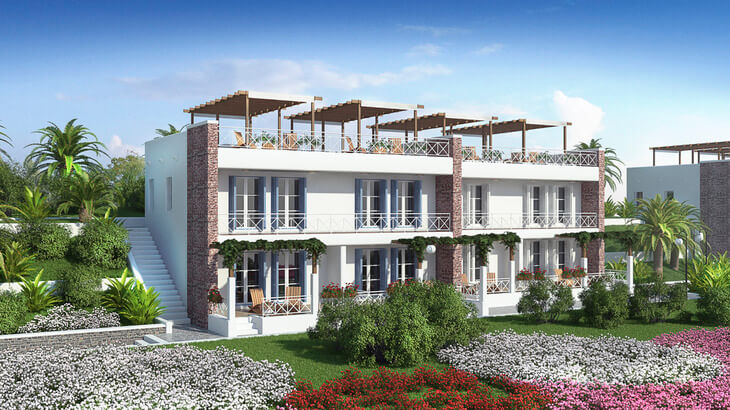 An off-plan apartment opportunity in Montenegro
An off-plan apartment opportunity in MontenegroStone Ruins
Ever dreamed of restoring an old stone ruin? These properties are popular with buyers and renters alike.
Be prepared, though – restoring a ruin takes time and significant investment. But the end result is a stunning, valuable property.
Land
Building your own home in Montenegro is an exciting option.
Many houses in Montenegro are outdated and tough to renovate. Starting from scratch lets you design modern, open-plan living spaces.
Labor costs are relatively low, making this a cost-effective choice.
You can also explore prefabricated houses, which are very affordable and built with modern materials.
Restrictions on Foreign Ownership in Montenegro
A foreign person cannot have an ownership rights over:
- Natural resources
- Goods in general use
- Forest and agricultural land over 5,000 square meters, unless there is a house on it that can be sold.
- Property located in an area that is, for the purpose of protection of interests and safety of the country, proclaimed by law as an area that a foreign person cannot own
- Cultural monuments of special importance
Exceptions to Foreign Ownership Restrictions
- You can buy agricultural land over 5,000 square meters by forming a company and using the company to buy the land
- EU citizens have the same rights as Montenegrin citizens in terms of property ownership
Securing Financing or Mortgages
You can get a mortgage to buy property in Montenegro. However, Montenegrin banks might require more documentation than usual, and the terms can vary. Having a local bank account helps to speed up the process.
Loan amounts are usually up to €200,000, but some banks offer up to €400,000. Loan terms are typically 20 to 25 years and current interest rates sit at around 5%.
Finding the Right Property
Beginning your search for the perfect property in Montenegro can be exciting. Start by exploring online listings of Montenegro properties for sale to get a feel for what's available and the going prices.
But don't just rely on the internet. Many of the listings online are outdated. In addition, local websites are only in Montenegrin and many of those in English have inflated prices.
A good real estate agent can be invaluable when you’re looking for a property in Montenegro. They can provide valuable local insights and access to properties that might not be listed online.
Choose an agent with good reviews and a strong track record to help guide your search. There is no regulation of real estate agents in Montenegro, so literally anyone can set themselves up as one with no accountability.
I recommend getting a real estate advisor who works only for you (not the seller) to help you short-list properties and negotiate a purchase. That way, you have a trusted advisor helping you and you can avoid scams. Click here to see who I recommend.
What to Look for in a Property
When you're looking at properties, think about what's important to you.
Do you want a quiet retreat in the mountains or a bustling beachfront condo?
Consider the size and layout of the property, the condition it's in, and whether you're willing to do any renovation work.
Also, think about the future: is the property likely to appreciate in value? Is the area developing in a way that suits your lifestyle?
Where to Buy Property in Montenegro
Location is crucial. A property in a popular tourist area like Budva might offer great rental potential, but it could also be noisier and more crowded than you like.
A home in a more remote area might offer peace and quiet but think about the accessibility and local amenities like shops, hospitals, and schools.
Also, look into the area's future development plans. Are there new infrastructure projects that could increase property values or impact the quality of life? Make sure the location aligns with your lifestyle and investment goals.
When looking at property for sale in Montenegro, it's helpful to think of Montenegro in four regions.
Coastal Region
The coastal region is made up of Kotor, Tivat, Herceg Novi, Budva, Bar, and Ulcinj.
These are the bustling areas along the coast, known for their popularity with tourists. Here, you'll find a variety of properties, from luxury apartments to charming villas, often with stunning sea views.
Prices in these areas tend to be higher due to their high demand and prime location but properties here are always in demand.
Bay of Kotor: The Bay of Kotor is the most popular place in Montenegro and includes the towns of Kotor, Tivat, and Herceg Novi.
It’s one of the most beautiful bays in the world, has an international airport just 5 minutes from Tivat, and it’s where most expats are based, including well-paid employees of luxury developments who will pay a premium to rent nice accommodation.
The Bay of Kotor is one of the best places to own a property in Montenegro.
Herceg Novi is one of the most underrated places to buy property in the Bay of Kotor. It’s cheaper than both Kotor and Tivat and enjoys full winter sun while Kotor gets only a couple of hours of sun per day in winter.
Budva Riviera: The Budva Riviera is popular with tourists because of its incredible beaches and summer resort vibe. It’s also just 30 minutes from Tivat Airport and has a lively expat community.
If you’re looking for a lively coastal city for yourself or great rental potential, the Budva Riviera is a top pick.
Bar and Ulcinj: Bar and Ulcinj are popular with regional tourists, but they’re far less popular than Kotor Bay and Budva.
Bar is a more commercial town, but has a small expat community because of its lower prices and because it doesn’t become so overrun with tourists in the summer.
Ulcinj is less popular and attracts beachgoers in summer, but few foreigners. It’s important to know that Ulcinj has a primarily ethnic Albanian population which sets it apart from the rest of Montenegro. Most of the tourists here come from Kosovo and there are few westerners.
The Capital, Podgorica
As the capital city, Podgorica offers a different vibe. It's the hub of business and urban life, with a mix of modern and traditional properties.
If you're looking for an urban lifestyle with easy access to amenities and business opportunities, Podgorica is the place to look.
Properties here can range from contemporary apartments to family homes and long-term rentals are always in demand.
In Podgorica, neighborhoods are important. Bloks 5 and 6, and Donja Gorica are family-friendly areas. Pod Goricom, City Kvart, and Preko Morače are higher-priced areas. Tološi is known for poor urban planning which means some streets have no sidewalks or drainage.
Central Region
The central region of Montenegro includes cities like Cetinje, Danilovgrad, Nikšić, Tuzi, and Zeta.
These are not touristy areas so prices are generally much cheaper than in coastal areas. The region offers a quieter lifestyle compared to the bustling coastal towns, but is still within an hour’s drive of Podgorica Airport.
If you’re looking for a quiet retreat at a bargain price, this is a good place to look.
Northern Region
Montenegro’s northern region includes Andrijevica, Berane, Bijelo Polje, Gusine, Kolašin, Mojkovac, Petnjica, Plav, Pljevlja, Plužine, Rožaje, Šavnik, and Žabljak.
Žabljak: Žabljak is the most popular tourist destination in north Montenegro. Set in the stunning UNESCO Heritage-listed Durmitor National Park, Žabljak is busy with international tourists throughout the summer. In winter it’s popular with regional tourists visiting Savin Kuk, Montenegro’s second-best ski resort.
Kolašin: As the nearest town to Biogradska Gora National Park, Kolašin is Montenegro’s second most popular mountain resort. It’s less busy than Žabljak in summer, but it’s incredibly busy throughout winter because Montenegro’s top ski resort is here.
Kolašin is currently experiencing a real estate boom, with various hotel and apartment developments underway.
Although prices in the north are cheaper than on the coast, investing here can be risky. The ski season is short and it’s hard to find property managers.
The rest of the northern region is generally unattractive for tourists and investment.
Cost of Property in Montenegro
Prices for properties in Montenegro vary widely. The price you'll pay depends on several factors:
Location: Properties along the coast or in popular tourist areas are generally more expensive.
Luxurious villas with sea views cost more than modest apartments or inland homes.
Condition and age of the property: Newly built or recently renovated properties tend to be pricier.
Access to amenities: Proximity to beaches, restaurants, and other amenities can drive up the price.
"Montenegro's house prices are poised to rise, amidst strong property demand and a booming tourism sector." - Global Property Guide
Cost of Property in Montenegro By Region
In Montenegro, properties are usually priced by square meter. Here are the latest average costs per square meter in each region:
Coastal region: €1,584
Podgorica: €1,700
Central region: €682
Northern region: €1,288
Average Price Per Square meter By Location
Location
Range
Median
Kotor
€1,800 - €3,800
€2,700
Tivat
€2,100 - €4,100
€3,000
Budva
€1,800 - €3,700
€2,450
Herceg Novi
€1,300 - €3,000
€1,900
Bar
€1,200 - €2,500
€1,800
Ulcinj
€1,100 - €1,700
€1,350
Podgorica
€1,250 - €2,100
€1,600
Luxury Developments
Montenegro has become a popular destination for luxury marina and residential developments. Real estate in these developments falls into a category of its own, with prices that are significantly higher than the local averages.
The three main developments are Porto Montenegro in Tivat, Portonovi in Herceg Novi, and Lušica Bay on Luštica Peninsula.
Here are the average prices per square meter for each of these developments:
Porto Montenegro: €7,000 - €10,000+
Portonovi: €9,000
Luštica Bay: €5,000 - €13,000+
Rental Returns
Renting your property when you’re not using it can help you get the most out of your investment. You can expect to make 4-8% in rental returns.
In Montenegro, the property rental market offers two main options: long-term rentals and short-term summer rentals.
Long-term rentals: There is a steady demand throughout the year for long-term rentals, especially in cities and towns. These rentals are great if you want a consistent income and minimal maintenance. Your tenants usually pay the utilities on top of the rent.
Short-term rentals: The summer short-term rental market is bustling, particularly along the coast, where you rent your property to tourists. This market can be very profitable, especially if your property is near popular beaches or attractions.
You can charge higher rates, but remember, this market is seasonal, peaking in the summer months and almost non-existent in the winter.
Short-term rentals are also higher maintenance and incur higher expenses.
Long-term Monthly Rental Prices By Location
Location
Range
Median
Kotor
€450 - €900
€650
Tivat
€450 - €1,200
€800
Budva
€400 - €1,200
€800
Herceg Novi
€250 - €850
€500
Bar
€300 - €750
€500
Ulcinj
€250 - €450
€400
Podgorica
€250 - €700
€450
The Purchase Process: Step by Step
Montenegro is very welcoming to foreign investors in its real estate market. Foreign investment is one of the main drivers of the economy.
When you're ready to buy property in Montenegro, here's what you'll typically do:
Step 1: Find Your Property
Start by picking out the property you want to buy. If you intend to buy over 5,000 square meters of land you’ll need to take an extra step and form a company. This is straightforward and a lawyer or accountant can help you with the process.
Step 2: Make an Offer
You (or your agent) will make an offer to the seller. Then, you'll negotiate the details until you both agree.
Typically, you can expect to settle on a price around 5% lower than the asking price.
Step 3: Pay a Deposit
When you find a property you like, the first step is signing a reservation agreement, which outlines the terms of the sale.
You'll need to gather some key documents. These include:
- Your passport or another form of ID.
- Proof of funds – showing you have the money to buy the property.
- A sales contract, which is the official agreement between you and the seller.
- A 'Cadastral Certificate' showing the property's legal status.
- A 'Proof of Ownership' document from the seller.
You'll usually pay a deposit, which can be up to 10% of the purchase price. This is held by the seller, their lawyer, or the real estate agency.
Note that if you pull out of the purchase the buyer is not obliged to return your deposit.
Step 4: Due Diligence
Your lawyer will make sure the property is legally clear for sale. Montenegrin properties often have complicated ownership records or are built without building permits.
If the property isn't clear for sale, you'll get your deposit back.
Step 5: Sign the Sales and Purchase Agreement
Your lawyer will negotiate the terms of the sales and purchase agreement with the seller’s lawyer.
Once you are satisfied you and the seller sign this agreement. You'll also pay to have it notarized.
Step 6: Complete the Payment
Follow the payment schedule outlined in the agreement.
Step 7: Pay the Title Transfer Tax
This tax, which is 3% of the property value, is due within 15 days of signing the agreement.
Step 8: Finalize the Transaction
Your lawyer will register the transaction and transfer the title deed into your name. This is done at the local land registry, known as the 'Cadastral Office.'
The land registry should change the ownership of the property within 60 days, but it sometimes takes longer. Once it is registered in your name you’ll get a new deed called a list nepokretnosti.
Fees and Taxes
When you're buying property in Montenegro, there are other costs involved you should be aware of. Typically, you should budget for an additional 3- 5% of the property's price to cover these extra expenses.
Here’s what you can expect to pay in fees and taxes.
Title Transfer Tax
If you are buying an existing property you'll pay a transfer tax. The amount of the tax depends on the price of the property:
- Properties up to €150,000: 3%
- Properties over €150,000 to €500,000: €4,500 fixed taxes plus 5% on the amount over €150,000
- New owners of existing luxury real estate: €22,000 fixed taxes plus 6% on the amount over €500,000
If you buy a new build directly from the developer there is no transfer tax because the VAT (21% sales tax) is included in the sale price.
If you are buying for the purpose of renting the property, you can claim the VAT back.
Notary Fees
A notary plays a crucial role when you’re buying property in Montenegro. They make sure all your documents are correct and legally sound.
The notary checks the property's ownership history, ensuring there are no legal issues. They also oversee the signing of the Sales & Purchase Agreement, making it official. The notary's job is to protect you by confirming that everything is in order before you finalize the purchase.
Notary fees are 0.35% of the purchase price plus VAT of 21%. For example, if you buy a property for €150,000 the notary fee will be €635.25 (€525 + €110.25).
Lawyer Fees
You will need a lawyer to check the legal status of the property, ensure all the documents are in order, and help with the contract and property registration process.
Your lawyer will check the property’s legal status and protect your interests in the transaction.
You can expect to pay around €1,000 for their services.
Interpreter Fees
As a foreigner, you must have a certified interpreter present when you sign the Sales & Purchase Agreement in front of the notary unless you have a Montenegrin residence permit or have passed a language proficiency test.
Interpreters charge €20 per page for documents. This comes to €120 for a Sales & Purchase Agreement. They charge €50 per hour for oral translation.
Real Estate Agent Fees
The seller takes care of the real estate agent’s fee, which is between 3% and 6% of the property value, so you, as a buyer, do not need to pay a real estate agent.
Fees and Taxes Calculator
Calculating the total cost of buying a property in Montenegro can be tedious. I have a Google Sheet that I use to automatically calculate the total cost of a property I'm interested in buying.
You can download a free copy of the spreadsheet here (click the link and click 'make a copy').
Buying Property in Montenegro Pitfalls
Buying property in Montenegro, like anywhere else, can come with its challenges. Here are the main pitfalls and how to avoid them.
Verifying Ownership Papers
Having a trustworthy real estate agent and lawyer is crucial when buying property in Montenegro. They will ensure that the property's ownership papers are in order.
It's not uncommon for properties here to have multiple owners, so verifying that the property has clear titles and valid building permits is essential.
This step helps you avoid getting entangled in lengthy legal disputes.
Understanding Access Rights
When considering a property, especially one that's been subdivided, it's vital to confirm your legal access rights.
Shared driveways are common, and you need to ensure that your property title includes legal access to avoid problems in the future.
Again, a good lawyer is essential.
Building Permits and Costs
While land and construction costs in Montenegro are generally reasonable, don't overlook the cost of building permits. These costs can vary significantly depending on the location and form a substantial part of the overall building expense.
Seek professional advice to understand these costs fully before making any commitments.
Pro Tip:
Prefabricated houses are widely available, use modern building materials, and don’t require building permits in Montenegro.
Restoring Stone Ruins
Restoring a charming stone ruin in Montenegro can be a dream project, but it requires skilled craftsmen, which can be costly and hard to budget for in advance.
Consult with restoration experts before taking on such a project to avoid unforeseen expenses and challenges.
Securing a Mortgage
If you're looking to secure a mortgage for your property purchase in Montenegro, be aware that local banks may not offer mortgages to foreign buyers.
You might need to arrange financing through a bank in your home country. This requires careful planning and understanding of the terms offered by your home country's financial institutions.
Avoiding Scams and Legal Issues
To avoid scams, always work with reputable real estate agents and lawyers. If a deal seems too good to be true, it probably is. Be cautious of anyone who pressures you to make quick decisions or pay large sums upfront without proper documentation.
Having a trustworthy real estate agent who works for you (not the seller) can make a huge difference. For example, some seemingly-idyllic areas of the Bay of Kotor get no sun because of the angle of the mountains. The agent selling the property won’t warn you about this, but an agent working for you will.
When it comes to legal issues, the key is to have a good lawyer, ideally recommended by someone you trust. Many foreigners have fallen victim to scams, purchasing problematic properties because they used lawyers recommended by the seller's real estate agent, who were often bribed.
Montenegro Real Estate Agent

I recommend buying property in Montenegro with the help of Jonathan Howe, a personal real estate agent.
Jonathan bought a stone ruin in my neighborhood in Montenegro and did an incredible job renovating it, so he has personally been through the process of purchasing and renovating in Montenegro.
He is also an experienced architect.
Since making Montenegro his permanent home, Jonathan has started helping others find and purchase properties in Montenegro.
He will help you find the perfect property and navigate the purchase process.
Aside from finding you your dream property, Jonathan offers a full suite of real estate and immigration services and will make the purchase process simple and stress-free.
He will help with:
- Finding the right home - he searches the Montenegro property listings and makes a short list of properties that fit your requirements and budget
- Negotiating an offer - he advises you on current market values and recent sales to help you make an offer that is fair and realistic
- Co-ordinating contracts, inspections, appraisals, title etc - he walks you through the legal process of buying real estate in Montenegro
- Purchase - Jonathan will be there with you every step of the way during as you finalize the purchase of a property
- After-sale support - he is there whenever you have any questions or need help after buying a property
- Temporary and permanent residence visas in Montenegro - Jonathan can help you to apply for residence permits in Montenegro
Rather than working for the seller as a real estate agent does, Jonathan works for you. He is your advisor who you can trust 100%. His priority is to protect your interests.
And his service is free to you.
If you're thinking about or have questions about buying real estate in Montenegro you can use the form below to contact Jonathan obligation free.
After the Purchase: What Next?
Handling Post-Purchase Procedures
After you've bought your property, there are a few more steps to take care of like seting up your utilities like water, electricity, and internet.
You'll need to visit the local utility providers for this. Bring your identification and property documents with you.
Utility Providers
Electricity: EPCG
Water: Vodovod
Garbage collection: Ćistoča
Telephone/internet: T-com
Integrating into the Local Community
Belonging to a local community is one of the best things about living in Montenegro.
I love that my son enjoys a free-range childhood where he spends every afternoon with the same kids from our neighborhood. The kids roam between houses and I know that someone from the community will call me if needed.
Here are a few tips to help you integrate into your new community:
- Visit your neighbors and introduce yourself. Neighbors are your first line of support and if you make an effort to be friendly they’ll often go out of their way to help you whenever you need a hand. They are also generous and will often bring gifts of homemade wine, brandy, and produce
- Try to learn some basic Montenegrin phrases; even a little effort goes a long way in making connections
- Participate in local events and activities. It's a great way to meet neighbors and learn about the culture
- Join local social media groups or forums for expats and property owners in Montenegro. These can be great resources for advice and support
Managing Your Property as an Absentee Owner
If you're not planning to live in your Montenegrin property year-round, think about property management.
A good property manager can take care of your home while you're away, handle any issues that come up, and even manage rentals if you choose to rent out your property.
Look for a reputable property management company with good reviews and clear communication. They'll ensure your property stays in great shape, giving you peace of mind.
Property managers usually charge 20-30% of your rental income.
Annual Property Tax
In Montenegro, if you own property, you'll pay property tax. This tax is quite low, ranging from 0.1% to 1% of the property's value.
The exact rate depends on the property's location and type. Each year, the local municipality decides the rate. You'll receive a bill for this tax, and it's important to pay it on time to avoid any penalties.
Rental Income Tax
If you plan to rent your property in Montenegro you can look forward to a return of between 4% and 8% on your investment.
This income is subject to 9% tax on taxable income. To calculate your taxable income you have two options:
- Gross rental income - expenses = taxable income
- Gross rental income - 40% = taxable income
The Resale Market
Thinking about the future resale value of your property is smart. The real estate market in Montenegro is growing and with EU membership on the horizon, property prices in Montenegro are predicted to triple.
Properties in popular tourist areas or places with ongoing development tend to hold their value well.
Making upgrades to your property can also boost its resale value. Modernizing your property to appeal to westerners will increase your property’s resale value.
If you sell your property, you’ll pay a capital gains tax of 15% on any profits.
Pro Tips: Insider Tips For Buying Property in Montenegro
Look beyond the coast: While coastal properties are popular, don't overlook inland areas. Places like Cetinje and Nikšić offer beautiful landscapes and often more affordable property prices if you’re looking for a lifestyle property.
Check for future developments: Before buying, find out about any planned developments in the area. New infrastructure like roads or tourist attractions can boost property values.
Consider the off-season: Visit the property or area during different seasons. Coastal towns are bustling in summer but quiet in winter. Make sure the location suits you year-round.
Consider older apartments: Although new-builds and pretty stone houses and apartments are attractive, older apartments in unattractive 90’s apartment buildings can be a great investment if they’re in a sought-after location.
Personally, these are what I go for because they have both long-term and short-term rental appeal.
Frequently Asked Questions
Can foreigners buy property in Montenegro?
Can foreigners buy property in Montenegro?
Yes, foreigners can buy property in Montenegro. There are no major restrictions, making it a straightforward process for you as an international buyer.
Can anyone buy property in Montenegro?
Can anyone buy property in Montenegro?
Absolutely, anyone can buy property in Montenegro. It's open to both locals and foreigners, with a simple buying process.
Can US citizens buy property in Montenegro?
Can US citizens buy property in Montenegro?
Yes, US citizens can buy property in Montenegro. There are no special restrictions for Americans, so you can invest in Montenegrin real estate just like locals.
Can Americans buy land in Montenegro?
Can Americans buy land in Montenegro?
Yes, Americans can buy land in Montenegro. There's no discrimination against foreign buyers, including those from the USA.
Can I buy a house in Montenegro?
Can I buy a house in Montenegro?
Yes, you can buy a house in Montenegro. The process is open to both local and international buyers.
Is it safe to buy property in Montenegro?
Is it safe to buy property in Montenegro?
Yes, it's safe to buy property in Montenegro. Just make sure to do your due diligence and consult a local real estate expert.
Is Montenegro a good place to invest in property?
Is Montenegro a good place to invest in property?
Montenegro is a great place to invest in property, thanks to its growing tourism and attractive real estate prices.
How much does a house in Montenegro cost?
How much does a house in Montenegro cost?
The cost of a house in Montenegro varies widely, depending on location and property type. Prices can range from affordable to luxury.
Can I get a mortgage in Montenegro?
Can I get a mortgage in Montenegro?
Getting a mortgage in Montenegro as a foreigner can be challenging. You might have better luck arranging financing in your home country.
Is there property tax in Montenegro?
Is there property tax in Montenegro?
Yes, there is property tax in Montenegro. It's a regular part of owning property here.
How much is property tax in Montenegro?
How much is property tax in Montenegro?
Property tax in Montenegro is quite low, typically ranging from 0.1% to 1% of the property's value.
What are the best cities to buy property in Montenegro?
What are the best cities to buy property in Montenegro?
Popular cities for property in Montenegro include Podgorica, Budva, and Kotor, each offering unique benefits.
Can you get Montenegrin citizenship if you buy a property?
Can you get Montenegrin citizenship if you buy a property?
Buying property in Montenegro doesn't automatically grant you citizenship, but it can be part of the residency application process.
How long does the process of buying property in Montenegro take?
How long does the process of buying property in Montenegro take?
The process of buying property in Montenegro can take a few weeks to a few months, depending on various factors.
Is it necessary to be in Montenegro to sign a contract of sale?
Is it necessary to be in Montenegro to sign a contract of sale?
It's not always necessary to be in Montenegro to sign a contract of sale. You can often arrange for remote signing through legal representation.
Final Thoughts
Buying property in Montenegro offers a great opportunity, especially when compared to countries like the USA, Canada, the UK, Australia, and New Zealand, where the barriers to entry can be much higher.
Property values here are on the rise, and if Montenegro joins the EU, you can expect an even bigger increase.
Whether you're looking at short-term or long-term rentals, there's a strong market waiting for you.
Remember, having a trustworthy real estate agent is key to ensuring a smooth process and avoiding scams. With the right guidance and knowledge, your investment in Montenegro's property market could be a smart move.
Resources
Here are some useful links with information about buying real estate and investing in Montenegro.
- Investment Climate in Montenegro - downloadable PDF.
- Global Property Guide - Montenegro
- Reasons to Invest in Montenegro - downloadable PDF.
- Home
- Travel to Montenegro
- Buying Property in Montenegro



